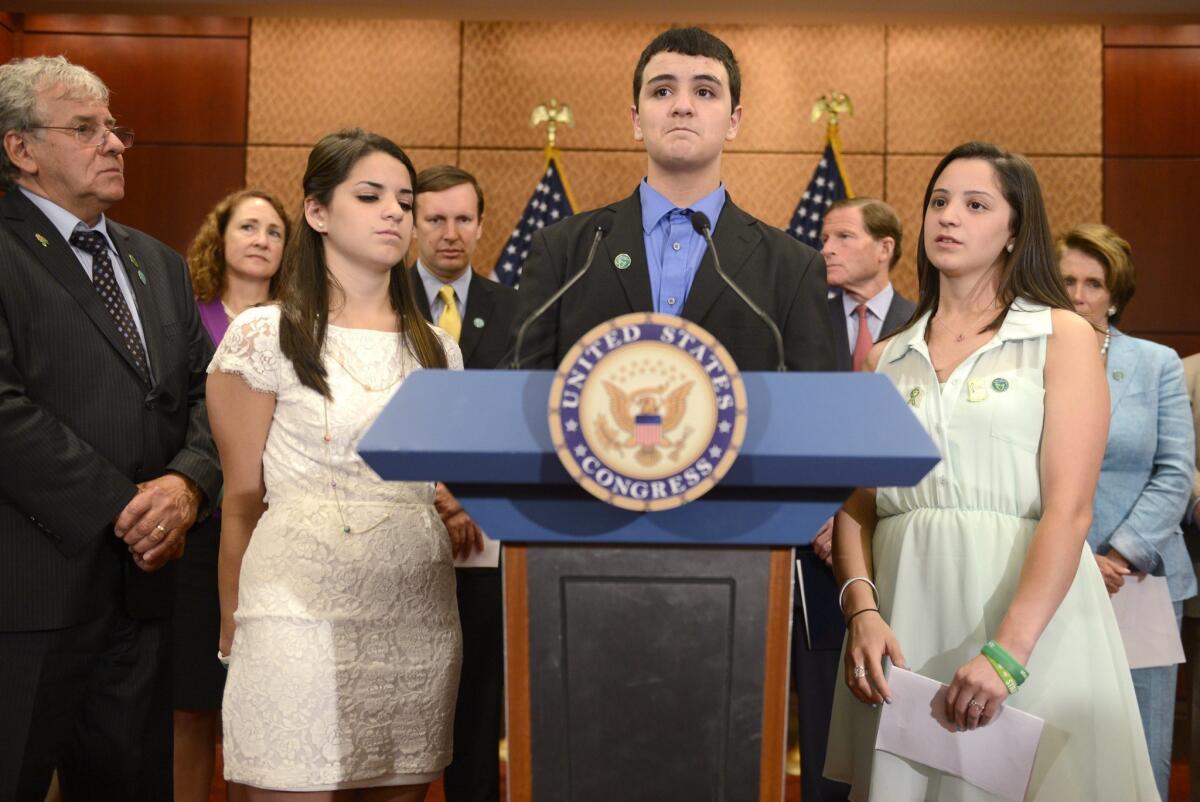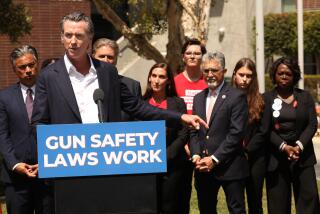After Newtown, gun control is making gains, state by state

Six months ago today, on Dec. 14, Americans reacted with horror to the slaughter of 20 children and six school employees at Sandy Hook Elementary School in Newtown, Conn. Suddenly, gun safety legislation was front and center everywhere, including Washington.
Then in April, a recalcitrant Senate succumbed to pressure from gun manufacturers and the NRA’s leadership and failed to pass even the most modest measure, a bill to extend background checks to gun shows and Internet sales. The president was angry, the families of victims frustrated, and the moment for gun control seemed lost.
But the Senate vote was hardly the whole story. Since the Newtown tragedy, gun regulation has made enormous gains in states across the country, with more on the horizon. In fact, an unprecedented number of gun control laws have been introduced, debated, voted on and enacted this year. What a difference Sandy Hook and six months have made.
MULTIMEDIA: Connecticut school shooting victims
Since December, six states have strengthened firearms laws. Connecticut, Maryland and New York passed packages that include laws to expand and improve background checks, limit the sale or transfer of military-style assault weapons and large-capacity ammunition magazines, require safety training and improve systems for keeping guns away from domestic violence abusers and the dangerously mentally ill. Delaware and Colorado passed laws requiring background checks on all gun sales, the very requirement that our federal government failed to enact. California added enforcement teeth to its law to confiscate guns from criminals and the mentally ill.
And in New Jersey and again in California, we’re tracking pending legislation that would tighten regulation of assault weapons and large-capacity ammunition magazines, regulate ammunition transfer and keep guns out of the hands of individuals who should not have them, among other common-sense regulations.
There have been setbacks: In Nevada this week a background-check bill was vetoed by the governor. But failure this year doesn’t mean the fight is over. In at least four other states where such legislation was introduced but didn’t become law, advocates are gearing up for another try next year. In all, we’ve seen a year-to-year increase of 231% in the introduction of common sense gun-safety legislation nationwide.
VIDEO: Newtown takes a stand on gun control
Post-Newtown success isn’t just about passing effective new legislation; it includes the defeat of several dangerous bills in some surprising places. The governors of two traditionally red states, Utah and Montana, vetoed legislation that would have allowed weapons to be carried in public without any permit or background check. The gun lobby argues that such laws deter gun violence, but in these two states, the governors paid attention to the research on this issue, which shows that more unregulated guns in public places puts communities at greater risk of gun violence. In Georgia, a bill that would have allowed guns in courthouses, churches and college campuses was defeated, and in Wyoming, a bill authorizing teachers to carry guns in schools failed to pass.
One reason for these successes is new energy brought to the cause from average Americans. Many of the grass-roots groups that have emerged since Newtown present an important contrast to the NRA’s stranglehold and historical political bullying. Moms Demand Action, Newtown Action Alliance and Americans for Responsible Solutions (started by former Arizona Rep. Gabby Giffords and Mark Kelly) are among the new voices for change. Additionally, many powerful existing groups have chosen for the first time to focus on this issue, including MoveOn, Credo and the Center for American Progress.
Well-respected research underlines what Americans instinctively get: Strong laws that keep guns out of the wrong hands reduce violence. More than 90% of Americans support universal background checks, including more than 80% of gun owners and more than 70% of NRA members. In the 20 years since a shooter with an assault weapon left eight dead and six wounded at 101 California St. in San Francisco (and inspired the formation of our organization, the Law Center to Prevent Gun Violence), the California Legislature has passed more than 30 laws to protect our communities and seen the state’s rate of gun death decline by 56%.
FULL COVERAGE: Connecticut school shooting
Those 20 years also provide us with a long view regarding the defeat in the Senate in April. That bill didn’t pass but it was, in its way, a victory. The fact that it was introduced, that hearings were held, and that it got 55 votes represents progress. After the vote, several senators felt real repercussions from their decision to vote against the bill, including Sen. Kelly Ayotte (R-N.H.), whose approval rating dropped by more than 15% immediately after the background check vote. There are now real consequences for legislators who choose not to represent the will of their constituents on this issue.
Gun violence is not a problem without solutions. We know what works, we’ve seen the difference it has made here in California, and we are finally seeing smart gun laws adopted in other states.
Americans woke up to the personal toll of gun violence in a dramatic way six months ago. And states are now answering the call to put safety first.
Robyn Thomas is the executive director and Juliet Leftwich is the legal director of the Law Center to Prevent Gun Violence.
More to Read
A cure for the common opinion
Get thought-provoking perspectives with our weekly newsletter.
You may occasionally receive promotional content from the Los Angeles Times.






